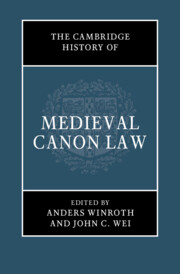Book contents
- The Cambridge History of Medieval Canon Law
- The Cambridge History of Medieval Canon Law
- Copyright page
- Contents
- Figures
- Maps
- Tables
- Contributors
- Acknowledgments
- Abbreviations
- Medieval Canon Law: Introduction
- Part I The History of Medieval Canon Law
- Part II The Sources and Dissemination of Medieval Canon Law
- 10 Theology and the Theological Sources of Canon Law
- 11 Church Councils
- 12 Decretals and Lawmaking
- 13 Roman Law: Symbiotic Companion and Servant of Canon Law
- 14 Law Schools and Legal Education
- 15 Local Knowledge of Canon Law, c. 1150–1250
- 16 Medieval Canon Law Manuscripts and Early Printed Books
- Part III Doctrine and Society
- Bibliography of Primary Sources
- Index
- References
10 - Theology and the Theological Sources of Canon Law
from Part II - The Sources and Dissemination of Medieval Canon Law
Published online by Cambridge University Press: 13 January 2022
- The Cambridge History of Medieval Canon Law
- The Cambridge History of Medieval Canon Law
- Copyright page
- Contents
- Figures
- Maps
- Tables
- Contributors
- Acknowledgments
- Abbreviations
- Medieval Canon Law: Introduction
- Part I The History of Medieval Canon Law
- Part II The Sources and Dissemination of Medieval Canon Law
- 10 Theology and the Theological Sources of Canon Law
- 11 Church Councils
- 12 Decretals and Lawmaking
- 13 Roman Law: Symbiotic Companion and Servant of Canon Law
- 14 Law Schools and Legal Education
- 15 Local Knowledge of Canon Law, c. 1150–1250
- 16 Medieval Canon Law Manuscripts and Early Printed Books
- Part III Doctrine and Society
- Bibliography of Primary Sources
- Index
- References
Summary
Theology derives from the Greek word “theologia,” literally discourse about God. For most of the Middle Ages, it referred solely to the study of the divine nature. During the course of the twelfth century, however, the term acquired a more expansive meaning. Under the systematizing and system-building impulse of scholasticism, theology came to refer to the study of almost anything related to God’s activity in creation and salvation. Angels, ethics, last things, and a whole host of other subjects came to fall under its purview. For the anonymous author of the Summa “Antiquitate et tempore” even canon law counted as a form of theology, but many of his contemporaries thought otherwise and, in the end, it was their more restrictive understanding that prevailed. Hostiensis’ (d. 1271) claim that canon law could be called a form of theology because it was of divine rather than human origin, which elicited much criticism from later canonists like Johannes Andreae and Panormitanus, is the exception that proves the rule. The terms “theology” and “canon law” eventually came to refer to distinct – even rival – academic disciplines.
- Type
- Chapter
- Information
- The Cambridge History of Medieval Canon Law , pp. 173 - 191Publisher: Cambridge University PressPrint publication year: 2022

